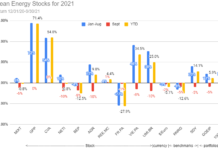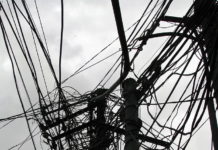Doug Young
Bottom line: Beijing should promote cutting-edge companies like Tesla that can help advance its new energy agenda, while abandoning ones like Yingli that use old technology to make cheap copycat products.
Two green energy stories were in the headlines last week, spotlighting China’s drive to become a global leader in the new technology and also the right and wrong ways to achieve that aim. An item involving US electric vehicle (EV) powerhouse Tesla (Nasdaq: TSLA) represented the right approach, with reports that the company might near a deal with Beijing to build a manufacturing plant in China. Meantime, former solar panel heavyweight Yingli (NYSE: YGE) was in the wrong approach column, announcing that its ill-conceived model of using old technology and cheap prices to do business had pushed it to the brink of insolvency, despite ongoing local efforts to rescue the company.
Beijing should take note of these 2 examples and do more to promote companies like Tesla that can develop cutting-edge technology for use in widely-respected products that the market wants. At the same time, it should abandon copycats like Yingli that don’t innovate and can only compete by offering cheap products using old technology.
In keeping with that approach, the government should finally pull the plug on companies like YIngli by letting them fail, while at the same time giving even bigger support to innovators like Tesla. Such a policy may cause some short-term pain due to plant closures, layoffs and lost investment for the copycats. But it will ultimately leave China with a field of healthier, more potent companies that can help it achieve its goal of becoming a global new energy leader.
China has made development of green industries a top priority over the last decade, with the aim of developing cutting-edge technologies that can be used both at home and exported abroad. That drive has gained added urgency in recent years as the nation grapples with worsening pollution, the result of years of breakneck growth with only minor attention to environmental protection.
One of Beijing’s earliest focus areas was the solar panel sector, whose products create pollution-free electricity using sunlight. Thanks to a wide range of incentives including tax reductions, cheap loans and low-cost land rights, the nation quickly built up a manufacturing complex that now produces more than half of the world’s solar panels.
Lack of Experience
But many companies that entered the field had little or no experience in the area, and instead relied mostly on cheap, older technology to produce low-end panels that were most attractive for their low prices. One of the biggest players to use that model was Yingli, whose cheap and relatively low-tech panels allowed it to quickly grow into the world’s largest solar panel maker.
But that strategy has sputtered due to a prolonged industry downturn created by too much capacity, and Yingli announced a year ago that it was running into serious financial difficulties. The company is now struggling to pay off its debt, and last week said there was “substantial doubt as to its ability to continue as a going concern” as it posted a loss of about 5.8 billion ($900 million) yuan last year. (company announcement)
While Yingli’s situation looked dire, things were much better for Tesla, which has previously said it would consider manufacturing its popular cutting-edge electric cars in China if given the right incentives. Tesla’s story was in the headlines late last week when its Asia chief Ren Yuxiang met with Xin Guobin, a vice minister from the Ministry of Industry and Information Technology (MIIT), which oversees the new energy auto sector. (Chinese article)
Both sides were eager to publicize the meeting, releasing photos of the men sitting together, heating up talk that the pair were closing in on a deal to build Tesla’s first manufacturing facility outside its home US market. Tesla’s ride into China hasn’t been easy mostly due to infrastructure and marketing issues, but its actual cars have been well received for their strong performance and cutting-edge technology. The company took a major step towards making its high-end products more affordable for average car buyers with the release last month of its latest car, the Model 3, which retails for a relatively affordable $35,000 before tax incentives.
Beijing should be commended for working hard to bring Tesla’s technology and manufacturing to China, which could ultimately help to promote similar development of China’s own domestic sector. At the same time, the government finally appears to be losing patience with Yingli after some quiet attempts to revive the company, and should work to conduct an orderly wind-down for this failed low-tech template for development in the fast-moving and fiercely competitive solar energy sector.
Doug Young has lived and worked in China for 20 years, much of that as a journalist, writing about publicly listed Chinese companies. He currently lives in Shanghai where, in addition to his role as editor of Young’s China Business Blog, he teaches financial journalism at Fudan University, one of China’s top journalism programs.. He writes daily on his blog, Young´s China Business Blog, commenting on the latest developments at Chinese companies listed in the US, China and Hong Kong. He is also author of a new book about the media in China, The Party Line: How The Media Dictates Public Opinion in Modern China.








